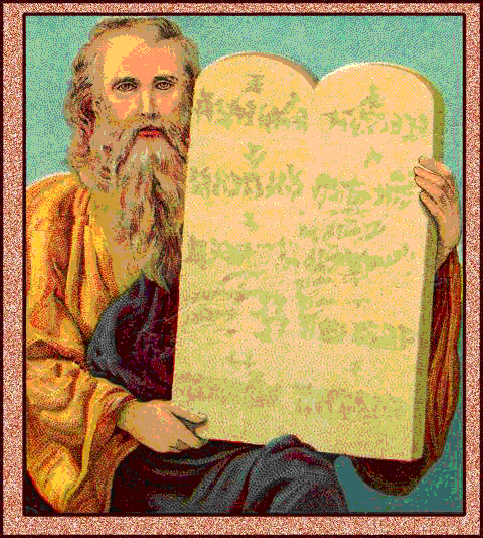There are two ways in religion.
After the flood there were those at the Tower of Babel who wanted to get to heaven by building and working their way. They said "Come, let us build ourselves a city, with a tower that reaches to the heavens, so that we may make a name for ourselves . . ." Genesis 11:4, NIV. Believers in false religion depend upon their own efforts to reach heaven and they glory in their own works. The Bible refers to this type of religion as Babylon, and God calls people to come out of it.
In contrast, the religion of love focuses on a loving Redeemer who is ever caring for His people.
 * He created them,
* He created them,
 * He lived for them,
* He lived for them,
 * He died for them,
* He died for them,
 * He was raised for them,
* He was raised for them,
 * He is preparing a home for them, and
* He is preparing a home for them, and
 * He gives eternal life to them as they accept the redemption He freely
* He gives eternal life to them as they accept the redemption He freely
gives to all those who believe in Him and let His Spirit lead them.
Saul the Pharisee followed the way of false religion. Filled with hatred, he persecuted the church, and thought he was doing God's will. But after he met the Saviour, he became Paul the Apostle, a loving child of God who could say, ". . . This one thing I do, forgetting those things which are behind and reaching forth unto those things which are before, I press toward the mark for the prize of the high calling of God in Christ Jesus." Philippians 3:13, 14, KJV. He realized that union with Christ was the greatest religion.
Amidst the thunder and lightnings and loud trumpet blasts on Sinai, God Himself spoke the Ten Commandments to Israel. He wanted them to realize that the Decalogue came from His own voice and not just through Moses. Then He wrote the Commandments on tables of stone with His own finger. Again, they came from God Himself.
Later the Ten Commandments were placed inside the ark of God under the Mercy Seat, where the Shekinah glory of God dwelt. The blood of the Day of Atonement was sprinkled there, showing God's mercy embracing justice.
If we consider the Decalogue as a mere legal relic of a sinful people, rather than the everlasting principles of God Himself, we ignore the fact that because of the violations of those principles, the Son of God died.
Let's review the principles of the first four precepts, which were written on the first table of stone. As we look at them carefully, it becomes obvious that Jesus was summarizing these four commandments when He described what He called the "greatest commandment." Jesus said, "Love the Lord your God with all your heart and with all your soul and with all your mind. This is the first and greatest commandment." Matthew 22:37, 38, NIV. The first four commandments have to do with our love for God:
I
THOU SHALT HAVE NO OTHER GODS BEFORE ME.
Here is the principle of loyalty to the God who sustains us and redeems us from sin. Nothing or no one in our lives should ever take the place of our loving God, who would give the supreme sacrifice for the salvation of even one lost sinner.
ll
THOU SHALT NOT MAKE UNTO THEE ANY GRAVEN IMAGE.
Here is the principle of dedication and how we worship God. We can communicate through prayer and study, with nothing in between to separate us from His presence in our lives.
lll
THOU SHALT NOT TAKE THE NAME OF THE LORD THY GOD IN VAIN.
Here is the principle of reverence. As we take the name Christian, God wants us to reflect the image of Christ in our lives. If we call ourselves Christians, but do not live as Christians, we are taking His name in vain. Our actions and conversations tell the world if we are indeed Christians.
lV
REMEMBER THE SABBATH DAY TO KEEP IT HOLY.
Here is the principle of devotion and holiness. Unless we take time to communicate with our Creator, we lose our sense of commitment and closeness to Him. God has provided the Sabbath as a day of rest and remembrance--a day for worship and for basking in His presence. He wants us to rest from our labors as He rested from His work in the creation of our world. We also have rest of mind and conscience by faith in the sacrifice of our Lord.
These four precepts, which were written on the first table of stone by God Himself, were intended to bring us into a closer relationship to Him, and to bind us to Him with bands of love that can never be broken.
"Oh that men would praise the Lord for his goodness, and for his wonderful works to the children of men! For he satisfieth the longing soul, and filleth the hungry soul with goodness." Psalm 107:8, 9, KJV.
The Lord said to Moses, "Come up to me on the mountain and stay here, and I will give you the tablets of stone, with the law and commands I have written for their instruction."
Exodus 24:12, NIV
And he passed in front of Moses, proclaiming, "The Lord, the Lord, the compassionate and gracious God, slow to anger, abounding in love and faithfulness, maintaining love to thousands, and forgiving wickedness, rebellion and sin. . . ."

